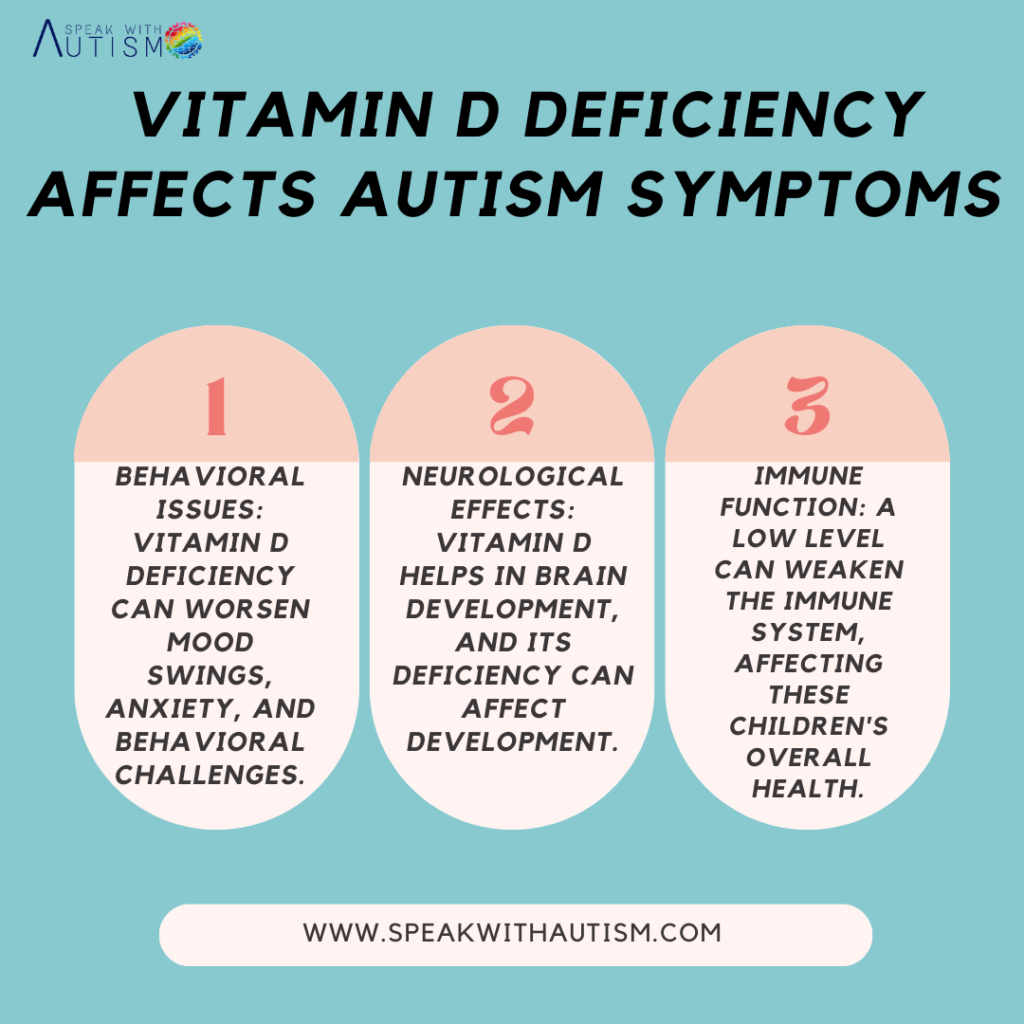If you are planning a pregnancy, or if you are pregnant, or your child has autism, then Vitamin D and autism information is very useful for you. Vitamin D deficiency can have a profound effect not only on physical but also on mental health. According to research, vitamin D deficiency may be related to autism symptoms and other mental health problems.
Table of Contents
Role of Vitamin D in Autism
Effect on brain and mood:
Vitamin D deficiency can cause problems like anxiety, mood swings, sleeping disorders and brain fog.
Autism and developmental delay:
Children who are found to be deficient in vitamin D may have an increased risk of autism or developmental delay.
Research results:
A study found that the use of vitamin D supplements can improve autism symptoms by up to 75%.
There has been a lot of research on the link between vitamin D deficiency and autism spectrum disorder (ASD). Some studies have found that children with vitamin D deficiency may have more severe autism symptoms and that adequate vitamin D intake may improve some behavioral symptoms.
Key research studies:
Randomized controlled trial of vitamin D supplementation in children with autism spectrum disorder: This study of 109 children found that vitamin D3 supplementation (300 IU per kilogram per day, maximum 5,000 IU/day) for 4 months significantly improved core symptoms of autism.
Core Symptoms of Autism Improved After Vitamin D Supplementation: A 32-month-old child was found to be vitamin D3 deficient, and showed significant improvement in core symptoms of autism after supplementation.
Vitamin D supplementation may be beneficial in ASD: This study of 43 children found that vitamin D supplementation (300 IU per kilogram, maximum 6,000 IU/day) improved autism symptoms after 15 weeks.
VITAMIN-D DEFICIENCY EFFECTS
Vitamin D values are:
- Normal: 30-100 ng/mL
- Insufficient: 20-29 ng/mL
- Deficient: Below 20 ng/mL
Get a blood test done
25-hydroxy vitamin D (25-OH) test is done to check the level of vitamin D.
Consult a doctor
Do not take vitamin D supplements without doctor’s advice. Take guidance of high dose or multivitamins as per the need.
Vitamin- D Natural sources and foods
The main source of vitamin D is sunlight. It may be helpful for him to sit in the sun for 15-20 minutes between 7-9 a.m. Apart from this, it can be obtained from milk, fortified foods, Egg yolk, cereals, Fatty fish (salmon, mackerel, tuna), and juices and supplements.

Importance of vitamin D in pregnancy and children
- Pregnant women should get their vitamin D levels checked. If the mother has a deficiency, then the child may be at increased risk of autism or developmental disorders.
- Children should be given daily value supplements like vitamin D, calcium, and magnesium, especially in winter when sunlight is less.
My personal experience : Vitamin D and autism

I had my son’s vitamin D blood test done 2 weeks ago. His level was found to be very low (9.54), indicating a severe deficiency. The doctor put him on high-dose vitamin D supplements for three months. Within 2 weeks of starting the medicine, I started seeing improvement in his mood, sleeping pattern, and other symptoms.
Final advice
If your child is suffering from autism then definitely get your vitamin D level checked. Take supplements as advised by the doctor and try to get enough sunlight for the child. This step can help reduce the symptoms of autism and improve the overall health of the child.
Note: This information is based on my personal experience and research. It is always better to consult your doctor.
Frequently Asked Questions
Do autistic children have low vitamin D levels?
Yes, several research studies show that autistic children often have low levels of vitamin D. Vitamin D is an essential nutrient that is important not only for bone health but also for brain development and the immune system.
What effect does vitamin D deficiency have on autism symptoms?
Research is still ongoing to determine whether vitamin D deficiency affects autism symptoms. But it has been shown that:
Behavioral Issues: Vitamin D deficiency can worsen mood swings, anxiety, and behavioral challenges.
Neurological effects: Vitamin D helps in brain development, and its deficiency can affect development.
Immune Function: A low level can weaken the immune system, affecting these children’s overall health.
